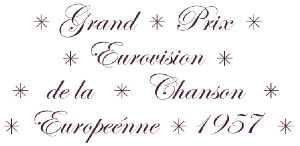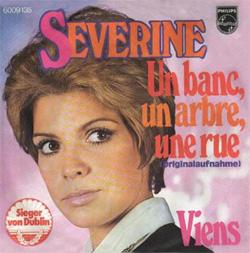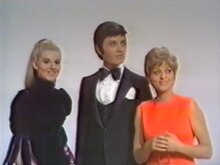
The Eurovision Song Contest 1957 was the second edition of the annual Eurovision Song Contest. Organised by the European Broadcasting Union (EBU) and host broadcaster Hessischer Rundfunk (HR) on behalf of ARD, the contest, originally known as the Grand Prix Eurovision de la Chanson Européenne 1957 was held on Sunday 3 March 1957 and was hosted at the Großer Sendesaal des hessischen Rundfunks in Frankfurt, West Germany by German actress Anaid Iplicjian.
The United Kingdom participated in the Eurovision Song Contest for the first time in 1957. The British Broadcasting Corporation (BBC) organised a national final, a second edition of Festival of British Popular Songs, to select the United Kingdom's entry for the contest. The country was represented by Patricia Bredin with the song "All" written by Reynell Wreford and Alan Stranks.
Germany held a national final to select the song that would represent Germany at the Eurovision Song Contest 1957. The winner was Margot Hielscher with the song "Telefon, Telefon".

"De troubadour", is a song recorded by Dutch singer Lenny Kuhr, with music composed by David Hartsema and lyrics by Kuhr herself. It represented the Netherlands in the Eurovision Song Contest 1969, held in Madrid, and became one of the four winning songs.

"Un jour, un enfant" is a song recorded by French singer Frida Boccara, with music composed by Emil Stern and lyrics by Eddy Marnay. It represented France in the Eurovision Song Contest 1969 held in Madrid, and became one of the four winning songs.

"Un banc, un arbre, une rue" is a song recorded by French singer Séverine, with music composed by Jean-Pierre Bourtayre and French lyrics written by Yves Dessca. It represented Monaco in the Eurovision Song Contest 1971 held in Dublin, resulting in the country's only ever win in the contest.

Siw Gunnel Margareta Malmkvist is a Swedish schlager singer and actress popular in Scandinavia and West Germany. She had a number one hit in West Germany in 1964 with "Liebeskummer lohnt sich nicht", and on 18 July 1964 she became the first Swede to have a hit on the US Billboard Hot 100 chart, when "Sole Sole Sole", a duet with Italian singer Umberto Marcato, entered the chart, peaking at No. 58.

"Primaballerina" is a 1969 song performed in German by Swedish singer Siw Malmkvist and written by Hans Blum. It was the German entry in the Eurovision Song Contest 1969. Malmkvist was the second of three female Scandinavian schlager artists to represent Germany in the contest in the late 1960s and early 1970s, the first being Norwegian Wenche Myhre in 1968 with "Ein Hoch der Liebe" and the third Danish Gitte Hænning with "Junger Tag" in 1973. Malmkvist had previously also represented her native Sweden in the 1960 contest with "Alla andra får varann".
Melodifestivalen is an annual song competition organised by Swedish public broadcasters Sveriges Television (SVT) and Sveriges Radio (SR). It determines the country's representative for the Eurovision Song Contest, and has been staged almost every year since 1959.
Sweden was in their second Eurovision Song Contest represented by Brita Borg with the song "Augustin". The winning song was elected in the Swedish national final: Melodifestivalen 1959. Eight semi-finals were held on the radio. During the semi-finals, Sveriges Radio decided that the winning song would represent Sweden at the Eurovision Song Contest 1959. The singer for Cannes had already been selected.
Sweden chose its entry for Eurovision Song Contest 1960 by the national final, Melodifestivalen 1960. The winning song, "Alla andra får varann" was performed once by Östen Warnerbring and once by Ingrid Berggren. However Sveriges Radio decided that Siw Malmkvist would represent Sweden, as she had been denied that the previous year.
Sweden chose their entrant for the Eurovision Song Contest 1961 through Melodifestivalen 1961. The song "April, april", performed once with Siw Malmkvist, once with Gunnar Wiklund, won. However, none of them was considered acceptable for singing in ESC, so Lill-Babs was chosen as representative instead. In the contest, once more held in Cannes, she finished in 14th place.
Sweden chose their entrant for Eurovision Song Contest 1969 through Melodifestivalen 1969. A tie occurred between two songs, but after additional voting, the song "Judy, min vän" with Tommy Körberg was selected. It was written by Roger Wallis and Britt Lindeborg. The other song, "Hej clown" was written by Lasse Berghagen and later ABBA member Benny Andersson.
Denmark took part in the Eurovision Song Contest for the first time at the Eurovision Song Contest 1957, held in Frankfurt, Germany. The Danish entry was chosen during a national final called Dansk Melodi Grand Prix.
The Netherlands was represented by Lenny Kuhr, with the song "De troubadour", at the 1969 Eurovision Song Contest, which took place in Madrid on 29 March. "De troubadour" was the winner of the Dutch national final for the contest, held on 26 February, and went on to become one of the winners in the four-way tie which ended the 1969 contest.
Belgium was represented by Bob Benny, with the song "Hou toch van mij", at the 1959 Eurovision Song Contest, which took place on 11 March in Cannes, France. The song was chosen at the Belgian national final on 15 February. Benny would represent Belgium again in the 1961 contest.
Germany was represented by Conny Froboess, with the song '"Zwei kleine Italiener", at the 1962 Eurovision Song Contest, which took place on 18 March in Luxembourg City. Twelve artists and 24 songs took part in the German preselection, which consisted of four semi-finals, followed by the final on 17 February. Each show was held in a different German city.
Norway was represented by Kirsti Sparboe, with the song "Oj, oj, oj, så glad jeg skal bli", at the 1969 Eurovision Song Contest, which took place on 29 March in Madrid. "Oj, oj, oj, så glad jeg skal bli" was chosen as the Norwegian entry at the Melodi Grand Prix on 1 March. This was the last of three Eurovision appearances in five years for Sparboe.
Hans Blum, also known as Henry Valentino, was a German singer-songwriter known for his distinctive musical style, which has been the inspiration of a generation of German musicians. His recordings include the hit single "Im Wagen vor mir." He wrote and conducted three entries that represented Germany in the Eurovision Song Contest: "Anouschka", "Primaballerina", and "Über die Brücke geh'n".
This is a list of German television related events from 1969.








